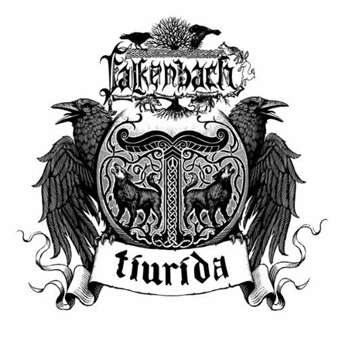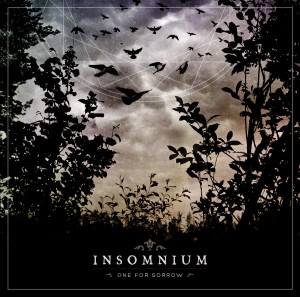 Originality is hard to come by in the vast realm of folk metal. Although the music can certainly be catchy and undeniably fun, the essence of the word ‘folk’ is seemingly lost within much of the culture. This is why Falkenbach mastermind Vratyas Vakyas’s understanding of, and dedication to, traditional folk music sets Falkenbach at the top of the pack.
Originality is hard to come by in the vast realm of folk metal. Although the music can certainly be catchy and undeniably fun, the essence of the word ‘folk’ is seemingly lost within much of the culture. This is why Falkenbach mastermind Vratyas Vakyas’s understanding of, and dedication to, traditional folk music sets Falkenbach at the top of the pack.
The first Falkenbach demo Havamal (1989) was purely clean folk music, and although the compositions have since been infused with metal touches, Falkenbach’s latest release arguably keeps closer ties to folk music than it does heavy metal. If any band deserves the title of ‘Folk’ or ‘Viking’ metal, it is Falkenbach, and Tiurida is perhaps the finest example of it yet.
No Falkenbach album would be complete without a mood-setting introduction, complete with falling rain, crackling thunder and chirping birds. Although this has pretty much become the norm in the folk/viking metal community, a look at Vakyas’s vast catalogue pretty much solidifies him as one of the originators of such techniques (aside from the legendary Quorthon (RIP) of Bathory, notably one of Vakyas’s biggest influences).
Although it would be difficult to accuse Vakyas of stealing such ideas from other contemporaries, anyone familiar with previous Falkenbach albums can easily parallel this intro to his past efforts. The first track from the 2003 opus Ok Nefna Tysvar Ty opens the album with a nearly identical sound-scape – a distant foghorn transitioning seamlessly, and in tune, into the first track of the album.
Although it’s hard to ignore such blatant borrowing from Vakyas’s previous works, the production and effectiveness of the section have certainly been improved after 8 years. The grand notes of the foghorn effortlessly set both the notes of the first song and the mood of the entire album in one swift stroke – informing listeners that the atmosphere and songs are not two separate entities, but rather one powerful force that carries its audience into the olden worlds of Nordic mythology.
The first full song ‘…Where His Ravens Fly…’ is a perfect example of Falkenbach’s current, matured sound. While older releases relied heavily on synthetic string and wind instruments to create that ‘Viking’ atmosphere, this first track displays how an eclectic array of folk instruments and lush vocal arrangements can achieve a similar character even more effectively.
The heightened production and relatively simple compositions of Tiurida greatly lend themselves to this organic sound. Vakyas’s use of distorted, drawn-out chords fashion a perfect palette for acoustic guitars and flutes to play melodies and harmonies above. ‘Runes Shall You Know’ and the closing track ‘Sunnavend’ are both prime examples of an acoustic guitar taking the melodic lead, while electric guitars provide a harmonic backdrop.
In addition to Vakyas’s unique arranging methods, he is not afraid to introduce major key and modal elements into his songwriting. The lively instrumental ‘Tanfana’ features a bright Lydian melody performed by a flute. In the dark and brutal realm of heavy metal, to call such composing rare would be an understatement. These unique experiments make Tiurida an exciting listen and, once again, tie Falkenbach’s roots much closer to folk music.
The darker expressions on Tiurida are executed in a slower and more brooding fashion than those on Falkenbach’s previous full-length, Heralding – The Fireblade. This 2005 release featured a very broad range of dynamics from track to track, switching between mid-paced Viking anthems and furious pagan black metal. Tiurida’s dynamics rely much more on diverse harmonies and melodies, rather than drastic changes in speed and aggression. For example, both ‘Time Between Dog and Wolf’ and ‘In Flames’ march at similar paces to many other tracks on the album, but the shrieking vocals and predominately minor chord progressions set them apart as much more melancholy offerings.
These changes in mood make Tiurida an emotionally compelling listen from start to finish, and the subtlety with which this is achieved lets the album truly feel like a single entity, rather than a collection of songs – and this is where the album prevails over its predecessor. (This is not necessarily surprising, for Fireblade was comprised of many rerecorded demo tracks, whereas Tiurida is newly composed material.)
Rather than folk-infused metal, Tiurida would almost be more accurately described as metal-infused folk. Stripping away the distorted guitars and harsh vocals, the listener is left with infectious and memorable folk songs. Similarly to other great folk metal bands, the heaviness simply adds power and heart to these epic tales and myths. Although this latest Falkenbach recording may not be the most daring step forward, its strong songwriting and diverse instrumentation will give even the most casual followers of the genre an extremely satisfying listen.

















